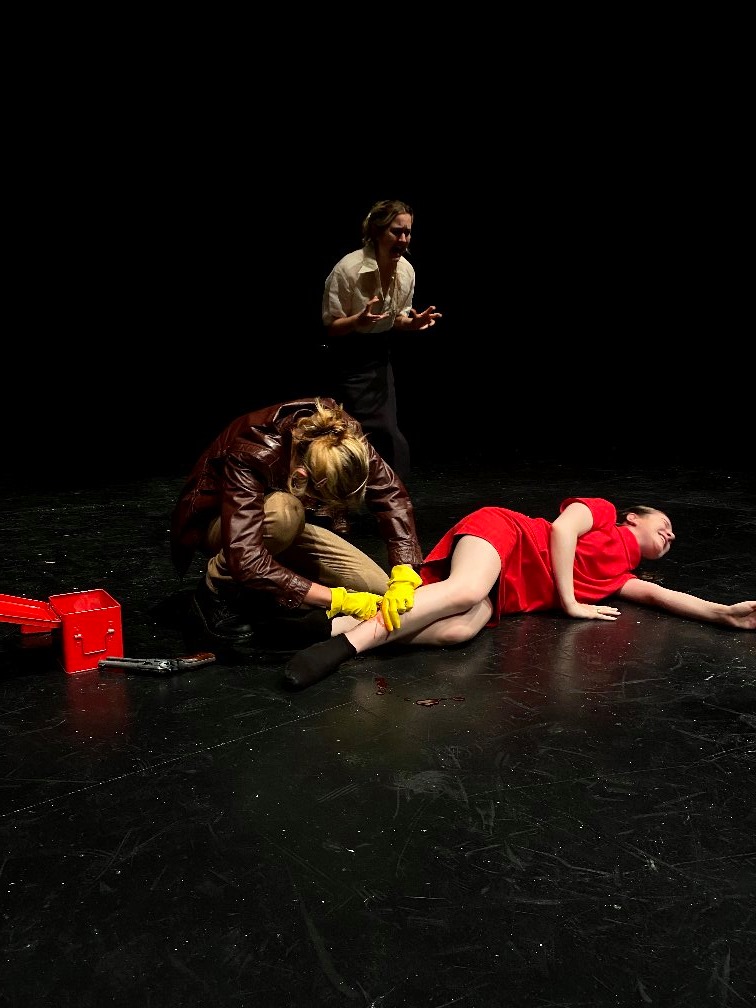Emotion turns cowboys into soulful women in this short, lively and timeless original production about the notorious Bonnie and Clyde. A successful simple love story, the one-act play was at its best when the two titular characters navigated their romance, illuminating as lovers rather than criminals.
A day in the life of Bonnie and Clyde, a very important day, was the framework for this less than an hour play which developed the theme of emotional love fruitfully and maturely. There were several profound moments where all the actors touched on something greater than outlaw antics, an honest line combined with consistently fine acting, which made the performance relevant and complicated creating deeper drama. It was an intelligent decision to focus, in varying degrees, on the characters’ personal history instead of the consequences of their actions as then tension grew naturally. This smartly contrasted the purposeful lack of stakes regarding the play’s crime element and this prioritisation paid off as I eventually did care in particular about Bonnie’s happiness. A well-achieved objective that made The Passion of Bonnie & Clyde compelling overall to watch.
Bonnie Parker was the beating heart of the show, dressed in red, seeing red often and always arguing, an indication of her full intelligence. Hannah Whiteway gave a great performance as Bonnie with a lot of warmth in her interactions, not just with Clyde, meaning she was more than likeable, and this helped communicate the play’s subtle message that strong personality forces weak persons to stand up. Bonnie’s walk like her drawl was classy, a motif found punctuating many scenes, her purposeful stride a comment on her power in her relationship. Clyde played skilfully by Victoria Iliffe was the antithesis of this womanly power, more a pubescent, messy-haired lad with terrible slouching posture and gangly awkwardness. The fact that Clyde was played by Iliffe, a woman, was almost handled perfectly. This gender-swapped role didn’t bring much attention to itself, and rightly showcased very believable masculine acting appropriate for an emotionally stunted wannabe John Wayne. The casting of gender here showcased the command of femininity with the knowledge that three of the cast were women and this drove the performance in one way to engagingly explore how emotional development informs gender.

Parallel to the bickering protagonists was the much healthier relationship between bank clerk Alicia Edwards and more diminutive co-worker played respectively by Alicia Edwards and Harry Daisley. Both dressed in lighter colours compared to outlandish Bonnie and Clyde suggesting relative poverty over total moral innocence, the little time these two received was effective in critiquing the main love story and itself enjoyable refined acting. With two thick American accents, cartoonish and convincing, this regular yet odd couple were refreshing on stage but should have been further used – or complemented by through an additional performance. There seemed to have been a plotline or viewpoint missing, which if included should certainly not be a large role and instead be another impactful incisively funny minor character to slightly lengthen and further shift the drama to comedy. Edward’s monologue about fairy tales stood out in an excellent way due to precise delivery. This, in my opinion Fargo-esque moment of parable storytelling, should have been expanded to either Daisley or someone else to further enrich the narrative.
The narrative by Ejiro Imiruaye, writer and co-director, was strong with a good script that occasionally enabled the cast to speak fluently in back-to-back dialogue including fitting old-style moments of two people chiming together in speech. The romantic ending was well-executed but would have been more intriguing if there was a greater dramatic counterweight within the show, an anti-romance that could be bitten into pieces. The three evenly spread-out contemporary references worked impressively as they loosened up the history of the well-known story, again emphasising how these four single characters have problems which are true in any age. The direction did create an attractive show – the diversion of blood across stage by a dropped bullet (coin?) worked on me – and the main issue that needed work was the transitions. It was made evident by this production, that stage transitions either need to be seamless or purposeful, and for further runs I believe the show would have to pick a side. Costumes quietly meaningful, set visually appealing sparsely staged, it was the clever short intermittent use of Motown music that added depth to this classic tale. Bonnie here though the bad singer, was the embodiment of soul and far stronger than Clyde’s half-baked Western persona.
The theme of emotional love carried the play to a passionate and comfortable ending. A realisation that it is never too late for emotion; emotion may not save your life but as the play positively demonstrates, above all else, it is the best starting place to save your soul. Well-acted and well-written, The Passion of Bonnie & Clyde was an original and confident production.

